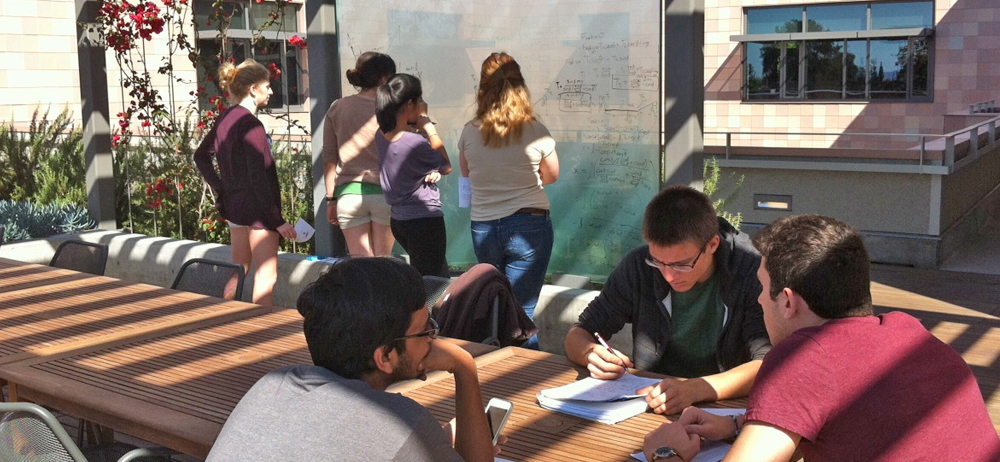Student-Directed Project Fund Greenlights Grand Ideas
November 21, 2014
Want to design an autonomous unmanned aircraft that could aid in disaster relief? How about a chance to engineer a hybrid rocket engine or to create a photo essay elucidating a sociopolitical conflict? What sounds like the stuff of research dreams is now reality for five Harvey Mudd teams, thanks to a generous gift to the College.
Each fall, the Shanahan Student-Directed Project Fund supports several student-directed projects undertaken solely due to student interest, and not because they confer academic credit. Established in December 2005 with a gift from Harvey Mudd trustee R. Michael Shanahan and his wife, Mary, the fund makes possible student-designed “dream projects” that demonstrate particular promise and ingenuity.
Jeffrey Groves, vice president and R. Michael Shanahan Dean of the Faculty, says the fund supports the College’s strategic goal of collaborative research while also letting students pursue projects about which they’re particularly passionate, but may not have the resources to explore. “The Shanahan Fund encourages creativity and self-motivation among our students, and I’m always amazed to see the quality and variety of the proposals they submit,” says Groves. “It’s very gratifying to see students both enjoy their pursuits and grow from their projects.”
Behind all the fun is a lot of hard work. Teams draft proposals outlining the specific details, timeline and estimated budget of their proposed research projects, making sure to set clearly stated, realistic parameters for project completion within the academic year. Selected student-directed projects require that a faculty advisor be responsible for managing the expenditure of funds and that teams formally report on research findings at the completion of their projects.
The five projects selected for academic year 2014–2015 are:
“Aerial Autonomy Competition (MAST) Mudd Aerial Systems Team”
This multidisciplinary project, proposed by juniors Akhil Bagaria, Benjamin Chasnov and Apoorva Sharma, calls for the construction of an autonomously controlled UAV (unmanned aerial vehicle). Typically, UAVs are controlled remotely during takeoff and landing and switched to GPS-guided autonomous mode at stable altitude. The project will include at least 11 students from several disciplines. The faculty advisor is Chris Clark, associate professor of engineering.
“Building a Turbidostat (Sequencer)”
Seniors Andrew Gibiansky and Devon Stork will construct a device that allows a bacterial cell culture to be supplied with an inflow and outflow of medium, dependent on the concentration of the culture. This tool has highly useful implications for molecular biologists studying synthetic biology, genetic circuits and directed evolution. The faculty advisor is Dan Stoebel, assistant professor of biology.
“Cloud Chamber—It’s Raining Radiation: Building a Large Perpetual Cloud Chamber”
Seniors Allison Mis and Tasha Arvanitis propose to build a simple, self-sustaining cloud chamber for the observation of charged particles during subatomic processes. Because these chambers have long been a symbol of the art intrinsic in physics, the team also hopes to display the completed chamber in an accessible campus location. The faculty advisor is Tom Donnelly, professor of physics.
“Hybrid Propulsion System Project 2013–14 (Continued)”
Andrew Donelick ’15, Jessica Chen ’15, Christopher Hirlinger ’15, Yeahmoon Hong ’16, Jonpaul Littleton ’15, Kristina Ming ’15 and Jacob Roth ’18 will continue a Shanahan project from last academic year. Specifically, the team seeks to improve upon the design of the oxidizer plumbing system in a hybrid rocket motor. The team will visit several rocket companies for consulting purposes. The faculty advisor is Greg Lyzenga ’75, professor of physics.
“Photo Essay: Remembering the 2010 Massacre in Bangkok”
Samaporn Tinyanont ’15 and Yossathorn Tawabutr ’17 will examine the social class conflict at the heart of recent Thai political violence through the medium of photography. The team will travel to Bangkok to visit the sites and subjects of existing source photography and to conduct its own photographic exploration. The faculty advisor is Ken Fandell, associate professor of art and holder of the Michael G. and C. Jane Wilson Chair in Arts and the Humanities.
